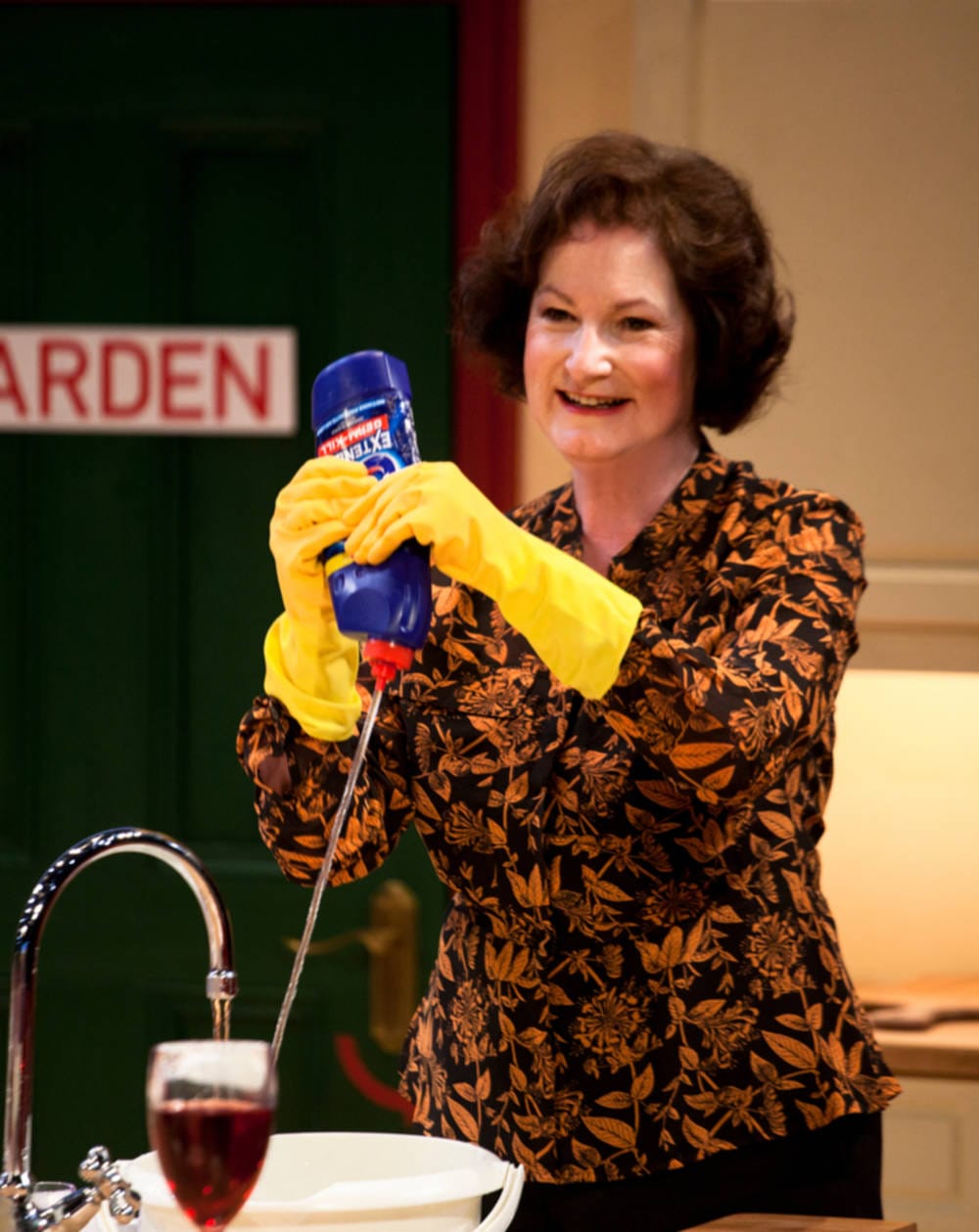The Rules of the Game
Fred Fyles thinks that the National Theatre's latest production is a snappy, comedic diamond in the rough

Any hope that the National Theatre’s Rules For Living would be a quiet affair was quickly dashed upon reading the programme: in the cast list, tucked under the usual Lighting Designers and Sound Technicians, is an acknowledgement for Kate Waters - Fight Director. This gives us a clear indication of the direction the play is going to go in, but really it should be obvious from the start - Rules For Living centres around that most volatile of environments: the middle-class christmas dinner.
Director Marianne Elliott takes Sam Holcroft’s explosive script, and transposes the action to the NT’s Dorfman Theatre, whose seats rise up like bleachers at a high school grudge match, a comparison that is only made stronger by Chloe Lamford’s set design, which transforms the stage into a giant game board. Lines mark out different territories, there are zones like ‘Home’ and ‘Garden’, and at the end confetti crowns the ‘winner’; but the most unique and intrusive aspects of the design are the large scoreboards that flank the ends of the stage, upon which the different family members’ various ‘rules for living’ flash up. Thus insecure Adam (Steven Mangan) must affect an accent to mock others, uptight Sheena (Claudie Blakley) must resort to alcohol whenever she wants to contradict, and the matriarch of the clan (Deborah Findlay) calms her nerves by scrubbing every surface in sight. The result is a snappy play that positively crackles with energy, although the staging format proves on occasion to be limiting to the plot progression.
One of the major themes of the play is CBT, or Cognitive Behaviour Therapy, a form of psychotherapy in which the root cause of anxiety and depression is sought out, and action taken to prevent future occurrences. It seems to me that many scriptwriters could do with some form of therapy, particularly those whose work involves a family at christmas time - there is rarely a happy ending, and Rules for Living is no exception, with resentment turning into grudges turning into outright warfare. Adam, whose dreams of being a cricket star have been crushed thanks to a Richie-Tenenbaum-Style meltdown at Lord’s, is now stuck in a boring job as a solicitor; he’s been eclipsed by his brother Matthew (Miles Jupp), who harbours a secret desire of going into musical theatre, but has instead was forced into legal work, thanks to his overbearing judge of a father (John Rogan). Matthew has rebelled - as best he can - by becoming involved with Carrie (Maggie Service), a bubbly blonde comedic actor, trying to make it big in the world of drama, who is a world apart from the no-nonsense neuroses of Adam’s wife Sheena.
Although such characters may, on paper, sound like a mere collection of stereotypes, the way the cast handles the roles really brings them to life, not least Deborah Findlay, whose Edith is imbued with a duality of maternal love and simmering rage. Claudie Blakely is also great in the role of Sheena, trying to hold her marriage together in the face of mounting apathy from her husband over their daughter’s depression, for which she is going to receive - surprise, surprise - CBT. At moments like this, where serendipity tips over into heavy-handedness, and the characters begin talking about how people live by certain ‘rules’, the script can feel somewhat sluggish, almost as if the audience is being spoken down to - after all, if the giant ‘rules’ screens on each side of the stage don’t make the metaphor clear, what will?
This intervention, which imposes certain actions upon the various characters, is a double-edged sword. On the one hand, it serves as a witty piece of stagecraft, giving us a clever insight into the characters’ inner lives; thus we experience a delicious burst of dramatic irony when Matthew, who must sit down to tell a lie, pulls up a chair to tell Sheena how tasty her gluten-free, dairy-free, joy-free mince pies are, and also a pang of sadness when he remains seated to tell Carrie how much he loves her. Elsewhere, however, it falls somewhat flat, like for Carrie, whose rule - she must stand up to tell a joke - means that she is forced to bounce around the stage like an overexcited rabbit; sometimes this works, adding a burst of physicality to the production, but other times it simply adds in another unnecessary element. The most intrusive rule is undoubtedly Adam’s, which leads to an extraordinary range of accents from Magnan, robbing from the audience any sympathy that we may have had for him.
As the play progresses, the rules begin to get more and more complex, piling up like a series of obstacles. For the most part, this works, but there are occasions where the script feels like a slave to the rules, rather than the master. With any other cast, things could have gone disastrously wrong, but the team manage to hold their own, with standout performances from Findlay and Blakely. Two final things to add: firstly, how refreshing it is to see a play written by a woman, directed by a woman, designed by a woman, and featuring a cast of exceptional women - this is the last production at the National Theatre under Nicholas Hytner, and I can only hope that such things continue with his successor. Secondly, the play culminates in a massive food-fight, with a mashed-potato-as-pathos mania as the whole christmas dinner is decimated; unfortunately not all the cast have a great aim - if you’re sitting in the front rows, I would recommend bringing a raincoat.
Rules For Living is on at the National Theatre until the 8th July. Tickets from £15










